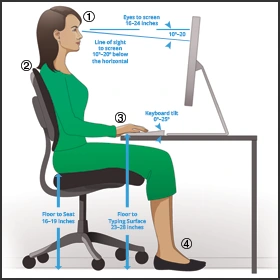Ergonomics: Working to be More Comfortable
COURSE NUMBER: 508
Credit Hours:
1 Hour(s)
SHARE
This course is designed to aid the reader in modifying the manner in which he/she practices dentistry. It is intended to provide methods to improve balance and strength as well as to examine existing clinical equipment to determine if modif...
(Use this feature to create assignments for your students and staff.)
Overview
This course is designed to aid the reader in modifying the manner in which he/she practices dentistry. It is intended to provide methods to improve balance and strength as well as to examine existing clinical equipment to determine if modifications are needed to practice in a stress free environment.
Work-related musculoskeletal disorders (WMSDs) take their toll on productivity, daily discomfort, and the length of a career in dentistry. While increased productivity is the goal of most courses on ergonomics, cognitive self-awareness will enhance comfort and well-being. Learning to self-assess for WMSDs will improve the in-office quality of life.
Intended Audience:
Office Managers, Dental Assistants, Dental Hygiene Students, Dental Hygienists, Dental Students, Dentists, Dental Assistant Students
Date Course Online:
Feb 7, 2017
Last Revision Date:
Dec 31, 2000
Course Expiration Date:
Feb 6, 2020
Cost:
Free
Method:
Self-instructional
AGD Subject Code(s):
Learning Objectives
Upon completion of this course, the dental professional should be able to:
- Understand the impact of physiological stress on one’s well-being.
- Understand how ergonomics is vital in all aspects of dentistry.
- Identify characteristics of equipment that will promote good ergonomics.
- Identify risks that lead to musculoskeletal pain.
- Identify the predominant areas of pain in the dental practitioner and how often they occur.
- Identify ways to modify the dental team’s work practice.
- Apply the concept of cognitive awareness to prevent musculoskeletal dysfunction.
- Learn how nutrition is important in preventing muscle pain.
- Recognize the benefits of physical activities in reducing musculoskeletal disorders.
Disclaimers
Participants must always be aware of the hazards of using limited knowledge in integrating new techniques or procedures into their practice. Only sound evidence-based dentistry should be used in patient therapy. Note: Registration is required to take test.
Submission Information
Recognition
Approved PACE Program Provider
THE PROCTER & GAMBLE COMPANY
Nationally Approved PACE Program Provider for FAGD/MAGD credit.
Approval does not imply acceptance by any regulatory authority or AGD endorsement.
8/1/2021 to 7/31/2027
Provider ID# 211886
(Use this feature to create assignments for your students and staff.)



